Generative AI: Why a Game Changer for Healthcare?
Recently, generative AI is gained significant traction in the healthcare industry, by making major healthcare professionals, providers, manufacturers, and patients prioritize gene AI for better outcomes and an easy service. Late 2022 was a turning point for generative artificial intelligence (AI) in healthcare, catalyzed by several advancements in technologies and releases of compressive large language models (LLMs) across the globe. Multiple organizations are focusing on the implementation of generative AI use cases and develop proofs of concepts. Organizations are investing heavily in Gen AI with the goal of enhancing operations and engaging stakeholders. The generative AI for the healthcare industry is emerging as a necessity with various advancements in full-scale implementations.
What is the Life Sciences Market Size?
The global generative AI in healthcare market size is valued at USD 2.64 billion in 2025 and is predicted to increase from USD 3.57 billion in 2026 to approximately USD 39.70 billion by 2034, expanding at a CAGR of 35.17% from 2025 to 2034.
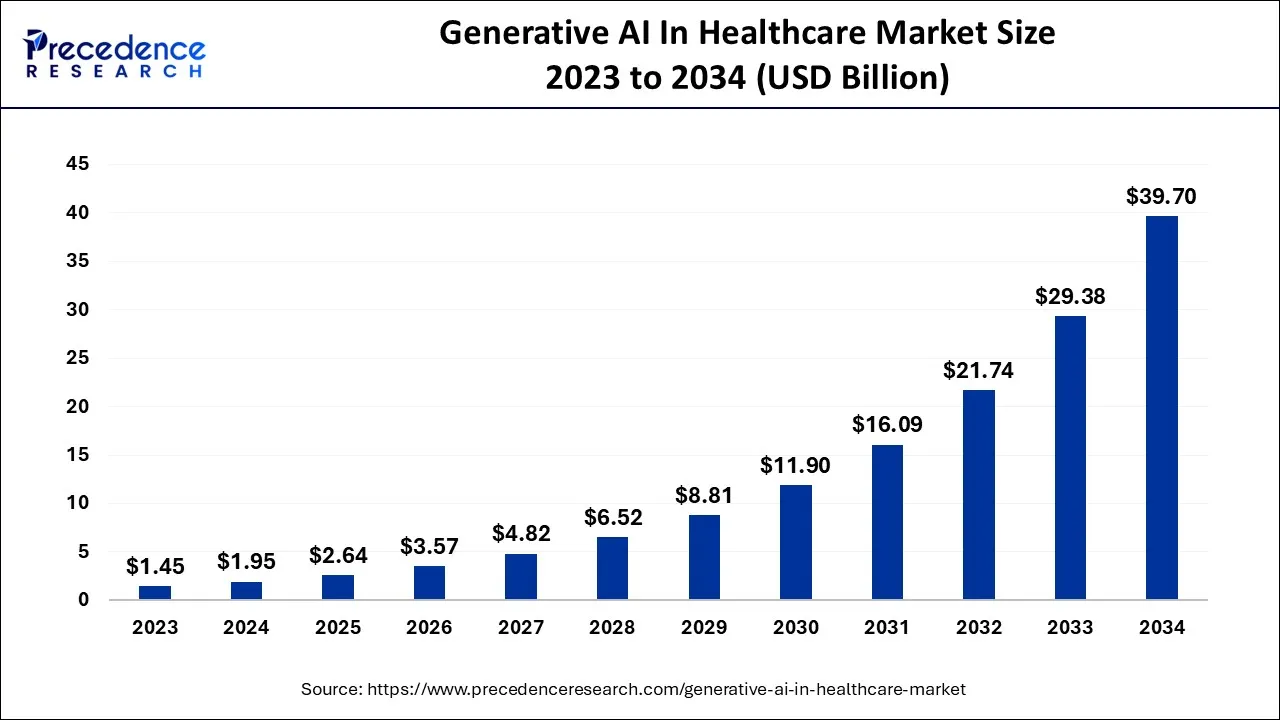
Major Key Takeaways for GenAI Recolonization in Healthcare:
- Technological Maturity
- Level of Risk to Patient Care
- Short-term Value Delivery
According to expert researchers from the Precedence Research, applications of generative AI in healthcare are diverse and far-reaching. It can assist in predicting diseases, identifying risk factors, and improving diagnostic accuracy by analyzing large volumes of medical records. Medical imaging can benefit from generating AI by generating artificial images that stimulate different conditions, aiding in training healthcare professionals and refining image techniques.
Furthermore, it can be used for data anonymization, removing personally identifiable information while preserving statistical properties and ensuring patient privacy. The global generative AI in the healthcare market is being driven by several factors including growing collaboration among the key players, technological advancements, and growing research and development activities.
Why Healthcare Shifted from AI to Gen AI?
Surge to Run Beyond Limitations: Explanation with Multiple Studies and Survey’s
The healthcare shift from AI to GenAI is a sophisticated factor of study, enabling focus beyond any limitations in the cutting-edge technologies. Traditional AI has several limitations, including the inability of creating content, difficulty with unstructured data, it’s limited flexibility and adaptability, and predictive outputs. Where generative AI is playing a crucial role in creating or generating spectacular content, handling unstructured data, improving personalization, accelerating drug discovery, enhancing patient experiences & outcomes, and automation administrative tasks.
The advanced model, including large language models (LLMs), such as GPT-4, is widely used in GenAI in the healthcare sector, particularly in the U.S. and the UK. According to Blease et al study, UK general practice it practitioners has already started integration of AI into their practices without any formal guidelines. The UK is stating earlier adoption of generative AI for the healthcare sector, where numerous physicians are using this technology to improve efficiency and decision-making capabilities in their daily performance.
Additionally, according to the McKinsey & Company survey with targeting 150 U.S. healthcare leaders across subsectors and builds on samples, 100 leaders from the first and second quarters of 2024 and the fourth quarter of 2030 has increased the use of generative AI.
Also, Precedence Research has covered the latest IBM Survey, highlighting that the highest adoption rates of AI are seen in Chinese and Indian businesses, at around 60%. In the USA (25%), UK (26%), Canada (28%), and Australia (24%), the adoption of AI was at or below 50%. source: Precedence ResearchRecent Study Demonstarting Use of GenAI by Physicians: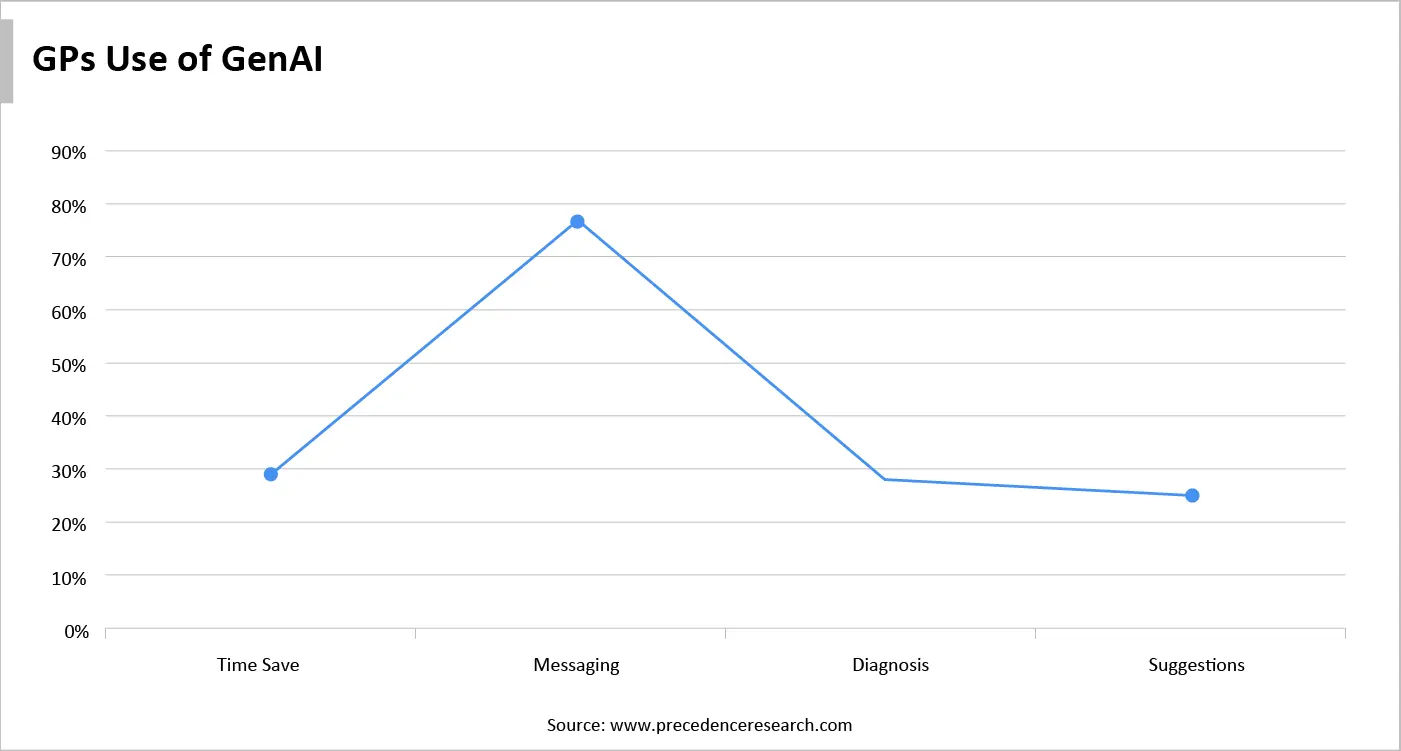
- According to a National Library of Medicine survey report, Jane AI has become streamlined in administrative tasks, especially in generating documents after patient appointments. The survey has reported that GPs' use of GenAI offers time savings of 29%.
- 76.9% of doctors use GPAI to write draft messages to patients.
- 28% GPs are using GenAI for various diagnosis driven by its ability to analyze a large volume of clinical data and suggest potential diagnosis.
- The use of GenAI has increased by 25% of GPs for suggesting evidence-based treatment options and improve clinical decision-making, specially for complex cases.
What is Difference in AI in Healthcare and Generative AI in Healthcare?
| Category | Major Applications | Examples |
| AI in Healthcare |
|
|
| Gen AI in Healthcare |
|
|
AI Technological Revolutionizing for Healthcare
There is a strong popularity growing for the large language module LLMs; however, despite this traction, there is a remaining notable lack of research examination for their role in healthcare workplace management. The study found in the National Library of medicine addresses this gap by evaluating the performance of ChatGPT 3.5, ChatGPT 4.0, Gemini, add Gemini advanced as a famous MLM in response to workplace response to workplace management challenges specifically in radiology.
ChatGPT 3.5 and ChatGPT 4.0 are both from OpenAI, San Francisco, CA, USA. Gemini and Gemini advanced both are tools of Google DeepMind, Mountain View, California, USA which are granted for answer to 31 fee selected questions on 4 different benefits, including patient management fee selected questions on four different areas of workplace management in radiology with benefits including patient management, imaging and radiation management radiation management, learning and personal development learning and personal development, and administrative and department management.
Innovative Approaches to Advance GenAI in Healthcare:
A US study has found the surge in standard large language modules LLMs, including ChatGPT, cloud or Gemini for enables to provide for enable to provide clinicians with sufficiently relevant and evidence-based answers to their medical questions. A retrieval augmented generation RAG system, chat RWT is essentially combines LLMs with a retrieval system for enhancing output and producing useful answers to 58% of questions, compared with two percent 15% for the LLMs.
According to this study, the digital interfaces are being roullet out rapidest for helping triage patients. For instance, an insight report from 2024, which was part of the World Economic Forum’s Digital Healthcare Transformation Initiative, a case study on digital patient platform Human, demonstrated the possibilities of readmission reduction rates by 30%, patient review time spent by up to 40%, and alleviating the workload of healthcare providers.
Generative AI and Its Impact on Healthcare Productivity:
Global leaders in AI and the healthcare industry are fuelling innovative projects to highlight the transformative power of generative AI by enabling healthcare providers across the world to embrace generative AI for enhancing patient care, fostering further innovations, and optimizing operations. The role of generative AI, from personalized treatment plans and automated diagnostics to virtual health assistance, Android discovery helping to reshape the conventional healthcare models and enhance outcome across the sector.
What are the Key Impacts of Gen AI across Healthcare Value Chain?
- Non-Clinical Operations
- Clinical Services & Operations
- Patient Experiences
- Branding & Community Outreach
- Audit & Complaince
By leveraging generative AI in healthcare workflows it enables high efficiency, predictive analysis, supply chain management, and clinical decision support. This technology is expected to fuel productivity by 30% to 32% by 2023, driven by largely utilization in non-clinical operations, clinical operations, in addition to sales, branding, and community outreach. There are some challenges like data sensitivity and legacy system in the utilization of generative AI; however, the technology is projected to boost the healthcare sector differing high productivity and enhancing patient outcomes across the globe.
Healthcare Meets Generation: Scope of GenAI
Generative AI is experiencing significant scope in the healthcare industry due to its transformative step for the sector. Healthcare professionals are increasingly demanding for adoption of GenAI in various clinical applications, including drug discovery, personalized medicine, and disease diagnosis. The GenAI in operational applications like administrative automation, patient engagement, and research optimizations is evolving healthcare performance.
GenAI is capable of offering automated routine administrative tasks like appointment scheduling, billing, and daytime entry. GenAI-driven chat boards and virtual assistants help to enhance patient engagement, provide personalized health information, and support. For the streamlined workflows, an optimization of research allocation GenAI is playing a crucial role.
Generative AI in research and development for medical research and synthetic data generation, enabling the identification of various patterns, predicting outcomes, and strong protection of patient confidentiality. 84% of healthcare executives expect to increase the adoption of GenAI. This technology is predicted to transform patient care, operational efficiency, and medical research with broad implementation and advancements in integration with multimodal AI models.
Gen AI Scope and Future Outlook: 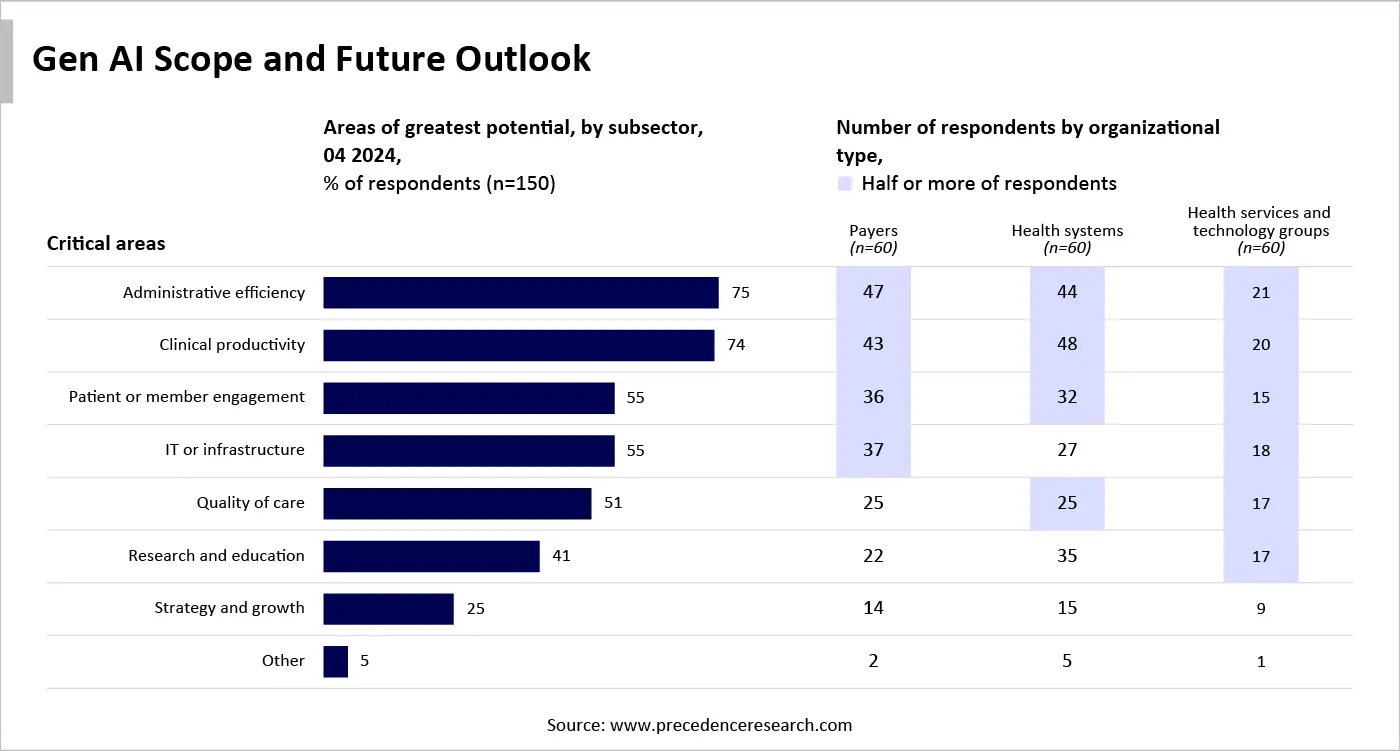
What is range of Adoption and Implementation of Gen AI in Healthcare?
The adoption and implementation of generative AI in Healthcare is leading the use cases and drivers, and exploring implementation challenges as well as opportunity facing healthcare organizations. The US healthcare system is the hub for respondents where the sample is to be representative across the organization size, segment, and geography, including both national and regional insurance serving commercial and medical or Medicaid plans and the healthcare system. There are several independent providers which are spanning primary and specialty care. According to survey benchmark, there are over 20 industrial stakeholders and incorporators prospectively acting as investors at the forefront of healthcare and AI technology.
The fourth quarter of 2024 saw the majority of respondents' organizations which have either implemented generation in a use case or started to develop proofs of concept. The majority of respondents were as at the implementation stage, then in the proof-of-concept stage in 2024, which suggested organizations to be successfully advancing their generative AI investments. However, there are some respondent’s organizations that can fall behind if they build out their capabilities in slow motion while early adapters will progress their in slow motion while early adapters will progress their capabilities more quickly and realize the impact from their own investments. 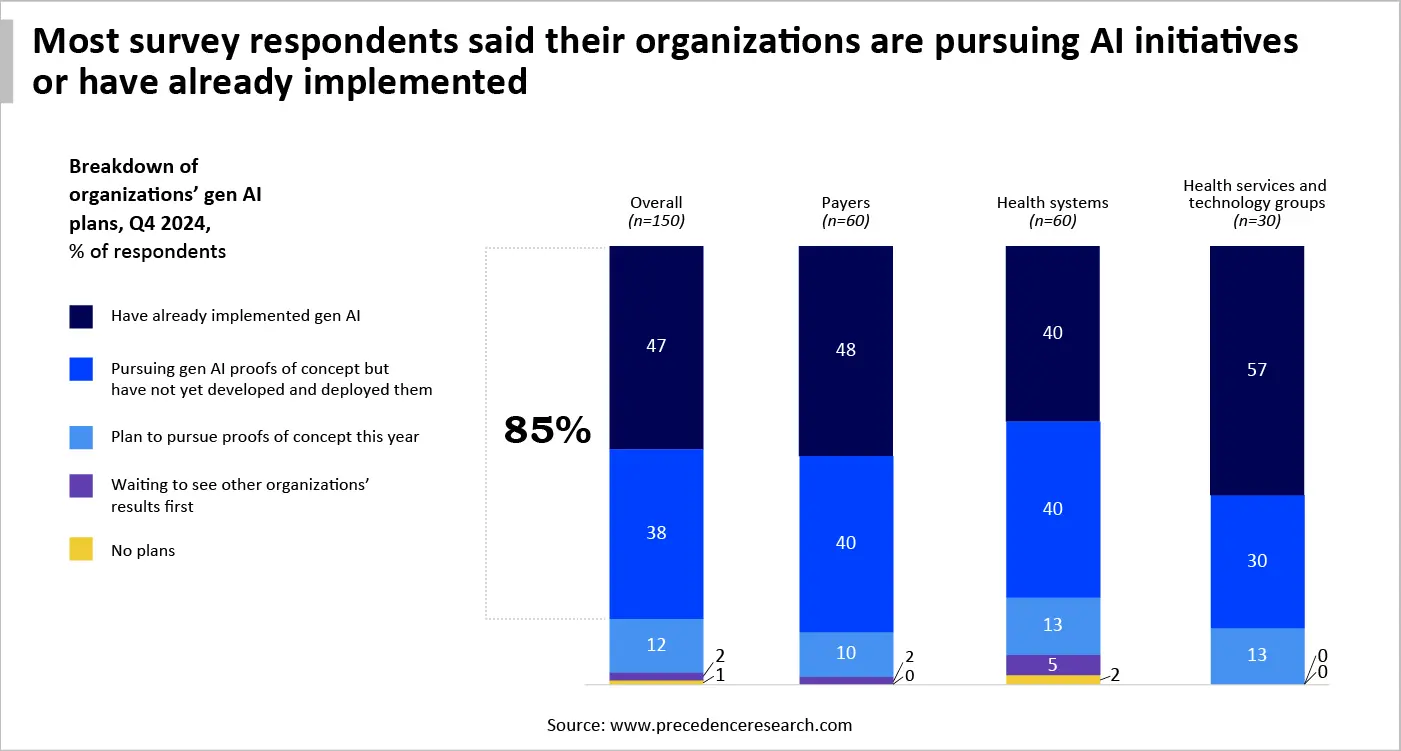
Generative AI in Life science
Generative AI has become a transformative tool for the life science industry in various ways, including drug discovery and development, medical imaging and diagnosis, and personalized medicines. Generative AI has the potential of addressing talent shortcuts, which is anticipated to have a significant impact and make the life science industry more efficient. The life science industry is experiencing an increase in the adoption of generative AI for new molecule generation and protein structure predictions through models like AlphaFold predict protein design therapies. The increasing use cases of generative AI for tailored treatment plans and synthetic patient data are helping patient data to train diagnostic models and overcome limitations that are labeled in medical data.
The ability of a GeanAI to offer image-to-image translation and synthetic medical images, including magnetic resonance imaging (MRI) are computed tomography scans, enables accurate and tailored diagnostic models and enhanced diagnostic accuracy. Leading models, like Evo 2, AlphaGenome, and AlphaProteo, are fueling innovations for GenAI to be used in life science operations.
- For instance, Evo 2 GenAI is a significant tool that predicts protein functions, generates new genetic sequences, and identifies useful molecules.
- AlphaGenome is a DeepMind’s tool predict gene regulations directly from DNA sequences, which addresses the dark matter of the genome.
- AlphaProteo is also a Google DeepMin’s tool that has been developed for a new protein to bind targeted molecules and transform protein engineering.
- Agentic AI is a more advanced class of AI that combines reasoning tool use and memory that allows it to performs multi-step tasks rather than just answering questions.
Major Revolanization in Gen AI for Life Science Sector in 2025:
NVIDIA Calara launched its new open models for healthcare and life sciences in October 2025, a family of models, tools, and recipes built for accelerating scientific discovery and analyzation of medical images and other process. This open model includes:
- Clara CodonFM, which learns the rules of RNA for revealing the ways of changes in its code to enhance the design of therapies and medicines.
- Clara Reason is a vision language model that enables chain-of-through reasoning for radiology and medical imaging for advancing explained AI medical research.
- Clara La-Proteina creates 3D protein structures atom model that evaluates the length and complexity of previous models, which enables the design of better medicines, materials, and enzymes.
According to Menlo Ventures' study, the Key areas of interest and investments for Gen AI in healthcare, by the leading companies, include areas of interest and investments for AI in the life-science industry prioritized by the killing companies, including quality and regulation by companies like Bluenote, Enzyme, Qualio, and Vena. Axiom and Vivodyne are playing a significant role in pre-clinical studies. Medical affairs prioritized companies are H1, Veena, and Medidata. H1, Tempus, ConcertAI, and Unlearn are prioritizing clinical trials: Source: Menlovc 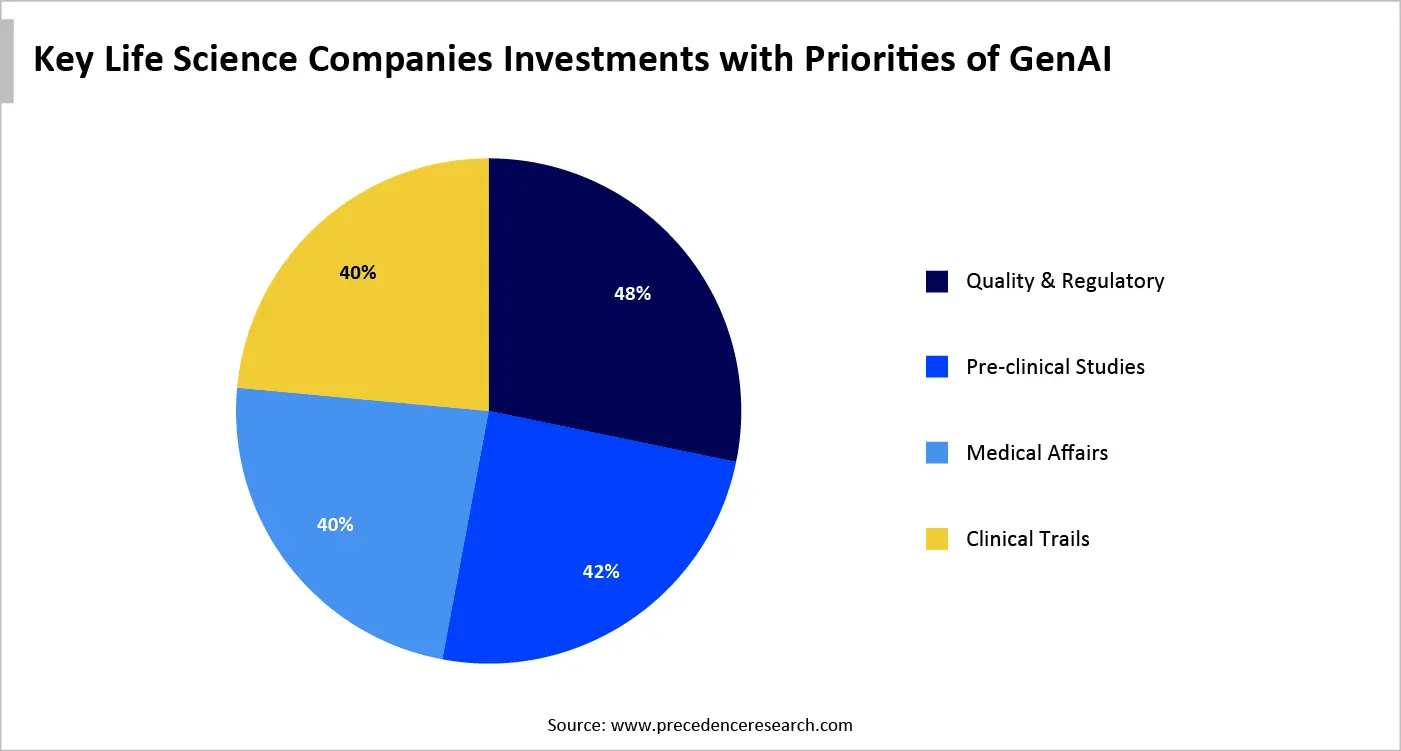
Which are the Major Country Experiencing Growth in GenAI for Healthcare with Endless Possibilities
- U.S.: The US has experienced over 700 healthcare executives, including senior leaders in benefits and insurance, executives in biotech and pharma, and decision makers and healthcare provider organizations.
- China: China is China is the second largest country evolving significant investments and innovations in generative AI for healthcare facilities and services by making AI as a national priority and formidable player, which is expected to have the largest growth in revenue from the healthcare industry by 2030. China’s focus on increasing utilization of AI for telemedicine in rural areas, managing the largest population health challenges for my interrupt discovery makes it possible.
- The UK: The UK's National Health Services (NHS) is a significant player enabling testing of ground for AI and its use for predictive analytics to manage chronic condition, AI driven chat boards for patient interaction, and research from institutes like deep mind from institutes like DeepMind Health.
- India: India is selecting health care organizations that are piloting the use of AI technology in a controlled environment to ensure accuracy of the technology before its deployment on a large scale. India is focusing on tackling the healthcare accessibility challenges in its broad and diverse population by using AI powered in its broad and diverse population by using AI-powered telemedicine platform and innovative diagnostic tools like AI-based breast cancer screening. The implementation of a Clinical Intelligence Engine (CIE) powered by LLMs in the Apollo hospitals is a great example.
What Concludes from this Countries Efforts?
The US has become the hub for hospitals to test generative AI for patient interactions and personalized care plans. India’s healthcare industry is expanding the use of generative AI applications, with a contribution of $64 billion to GDP in seven years, especially for streamlining outpatient journeys and clinical documentations to enhance patient care. Additionally, government initiatives and support for smart healthcare enable innovations and adaptations of generative AI in the healthcare sectors of the UK and China.
Healthcare Revolution: Partnerships and Technological Innovations
Precedence Research has showcased a major factor to offer potential future in the healthcare industry to adopte GenAI. According to the report, GenAI for healthcare is expanding due to strategic collaborative efforts between technology providers, healthcare institutions, and research organizations. These partnerships are enabling significant exchange of resources, expertise, and knowledge, which is helping to push toward the boundaries of generative AI application in the healthcare industry.
The collaboration enables significant advancements in AI technologies, data availability, and computational power to provide significant growth and comprehensive GenAI solutions.
Partnership & Hyperscale’s Push Toward GenAI: 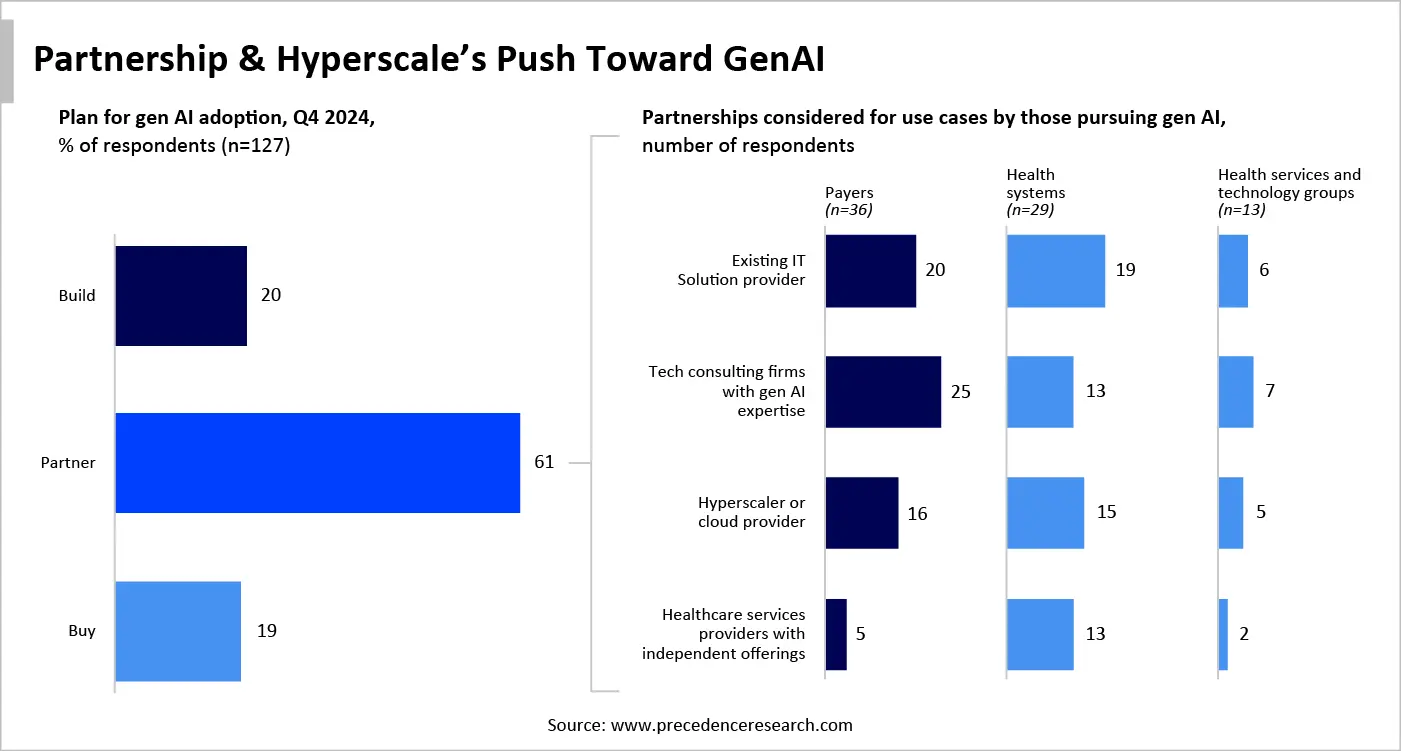
- The report from McKinsey & Company demonstrates that partnership among respondents it’s becoming a significant trained to enhance strategies for the adoption of GenAI. Among respondents who are implementing generative AI, 61% intend to pursue good aggression with third-party vendors for the development of customized solutions as their primary strategy.
- 20% are intended for building generative AI capabilities in-house, and 19% are intended to buy off-the-shelf solutions.
- 58% respondents are expecting their existing it solution partners to fill the role, and 46% are exploring collaborations with hyperscalers due to their vendors' expertise in data management.
New Risk Policies for Gen AI in Healthcare:
The utilization of various free or unsanctioned tools on personal or work devices has increased, which is predicted to introduce risk to an organization. Healthcare industry is a constant industry with significant and major cybersecurity targets averaging $9.8 million per incident, according to all klas research analysis, which found that assist management was an opening for data breaches. This analysis has suggested far more reactive efforts compared to proactive ones among healthcare organizations.
Major leading companies are focusing on figuring out the way of AI technology to fit into policy-making with new policies and standardization. AI technology is no longer being confirmed to a couple of major technologies, including its integration into administrative tools, decision support, and analytics. According to the 2024 Healthcare Cyber Security Survey report from HIMSS has showcased stronger cyber security governance as a requirement for emerging and evolving areas in AI.
Gen AI Redefined: Navigating New Policy Implementation for Healthcare Use
Several International & Regional Policies:
| Country | Regulation | Overview |
| Europe | EU AI Act |
|
| U.S. | FDA Draft |
|
| U.S. | The U.S. Department of Health and Human Services (HHS) |
|
| India | HealthAI Global Regulatory Network (GRN) |
|
What is held in Future for GenAI in Healthcare?
With growing focus on the implementation of generative AI for enhancing administrative efficiency, infrastructure gaps, IT gaps, and increasing clinical productivity with respondents' early use cases, GenAI is projected to expand rapidly in the healthcare sector. Generative AI for the healthcare industry is expected to solidify its position with growth in external engagements with patients or members and quality of care use cases to enhance further patient and member experiences. Industry leaders agree on risk management for the implementation of AI as an important and, considering approaches including AI governance approaches to advance the safety of the effort.
Multiple organizations have already created their own capabilities and are appropriately targeting their GenAI efforts, with the most successful achievement at scale implementation. Development of generative AI is becoming important in the healthcare space, along with leaders' consideration for a position in their organization for the upcoming period. The ability to generate AI to reduce costs and time savings more crucial element for the future. Organisations are significantly competing and the adoption of this technology to solidify their position in the global market. Implementation of generative AI needs a value-driven strategy, strong organizational management, and strong delivery capabilities.
Generative AI capabilities are seeking to quantify the impact of their investments in technological innovations and adoption. 64% of reported have anticipated or have already quantified positive ROI and suggesting high expectations for generative AI technology in the future among respondents who have already implemented this technology use cases, according to McKinsey & Company.
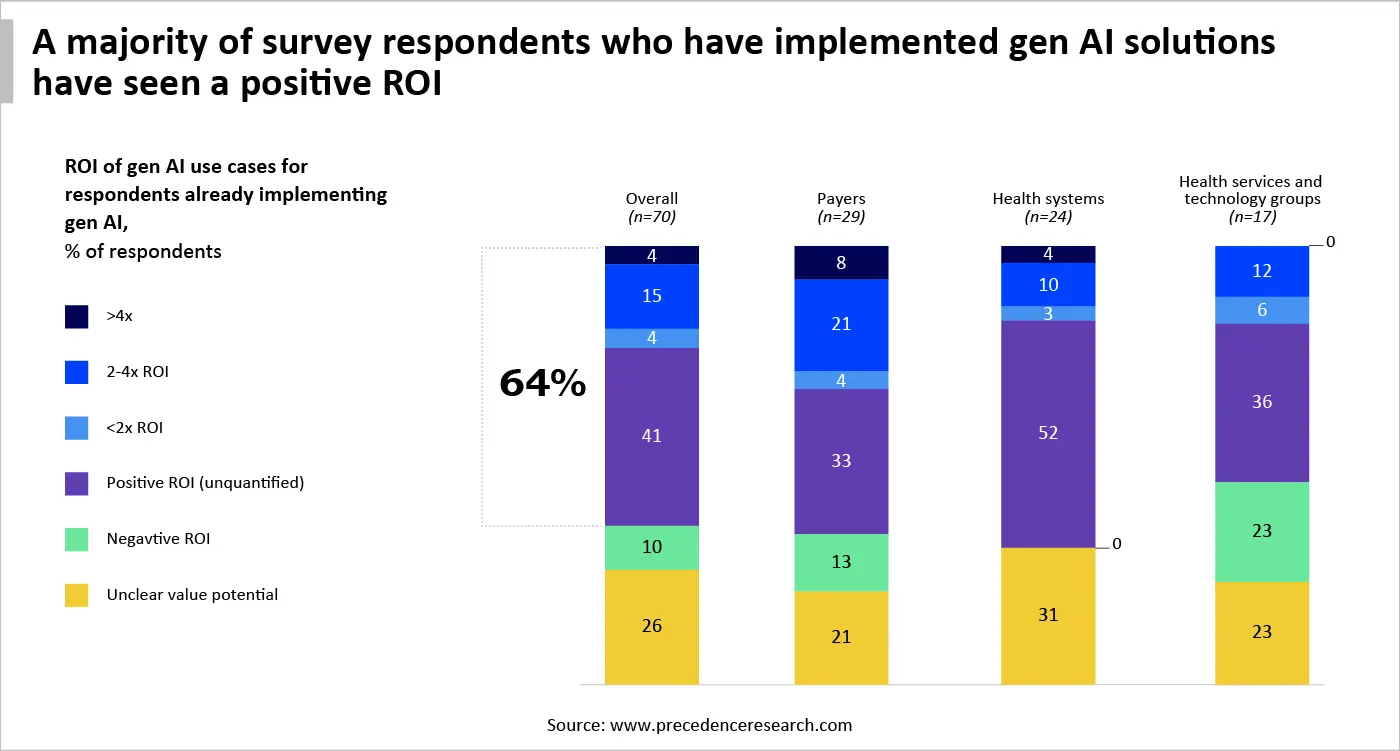
Industry Booming: Which Investors Betting Big on GenAI?
Generative AI for the healthcare industry is seeking significant investments by several investors to transform the industry in various ways, including enhanced diagnostics, faster drug discovery, personalized medicine, streamline clinical workflows, mental health solutions, enhance efficiency, and potential for high returns in the future. Notable investments from investors like Xiara Therapeutics, Hippocratic AI, and Freenome have boosted this growth. Overall, investors are big on generative AI for healthcare services and facilities to improve the potential of the industry in enhancing patient outcomes and generating significant returns on their investments.
Some Major Investments:
- In October 2025, over $1 billion was invested by Mayo Clinic in AI for over next few years across over 200 projects to go beyond administrative automation, including patient care and diagnostics. Source: News Medical
- One of the largest independent radiology groups in the U.S., SimonMed scaled its collaboration from co-building with fewer than 10 vendors to piloting solutions from over 50 in October 2025. This includes AI systems for intake, revenue cycle management, and ambient scribing. Source: Forbes
- In September 2025, a leading digital mental health platform, Grow Therapy, developed an AI care companion to bridge in-session therapy with 24/7 support and pioneering continuous measurements via voice and language analysis. This technology is designed to replace static assessment tools, including PHQ-9 and GAD-7. Source: Growtherapy
- In August 2025, more than 225 AI solutions were evaluated by Advocate Health to select 40 use cases to go live with Rad AI, Aidoc, and AI for its call center. More than 50% initiatives were predicted to reduced documentation time with automating prior authorization, coding workflows, and referrals. Source: Beckers Hospital Review
- Abridge’s ambient documentation solution was deployed by Kaiser Permanente in August 2024 across 40 hospitals and 600+ medical offices. This deployment made the largest GenAI rollout in healthcare history and Kaiser’s fastest technology implementation in more than 20 years. Source: Beckers Hospital Review
Conclusion:
Generative AI is a promise and potential for unlocking the future of healthcare. Regenerative AI is poised for a transformation of the healthcare industry by offering numerous benefits, including enhanced diagnosis accuracy, personalized medicine, and streamlined clinical workflows. Governments worldwide are implementing several regulations to ensure the safety and effectiveness to the use of generative AI in healthcare, making significant potential love technological utilization without any risk assessment. With the industry growing exponentially, several responders and investors are taking notice and stepping toward further significant investments pouring into the generative AI startups. There is a future with strong expectations of widespread adoption of Gen AI in healthcare, along with spectacular technological advancements and regulatory clarity.
About the Authors

Aditi Shivarkar
Aditi, Vice President at Precedence Research, brings over 15 years of expertise at the intersection of technology, innovation, and strategic market intelligence. A visionary leader, she excels in transforming complex data into actionable insights that empower businesses to thrive in dynamic markets. Her leadership combines analytical precision with forward-thinking strategy, driving measurable growth, competitive advantage, and lasting impact across industries.

Aman Singh
Aman Singh with over 13 years of progressive expertise at the intersection of technology, innovation, and strategic market intelligence, Aman Singh stands as a leading authority in global research and consulting. Renowned for his ability to decode complex technological transformations, he provides forward-looking insights that drive strategic decision-making. At Precedence Research, Aman leads a global team of analysts, fostering a culture of research excellence, analytical precision, and visionary thinking.

Piyush Pawar
Piyush Pawar brings over a decade of experience as Senior Manager, Sales & Business Growth, acting as the essential liaison between clients and our research authors. He translates sophisticated insights into practical strategies, ensuring client objectives are met with precision. Piyush’s expertise in market dynamics, relationship management, and strategic execution enables organizations to leverage intelligence effectively, achieving operational excellence, innovation, and sustained growth.





 Request Consultation
Request Consultation

